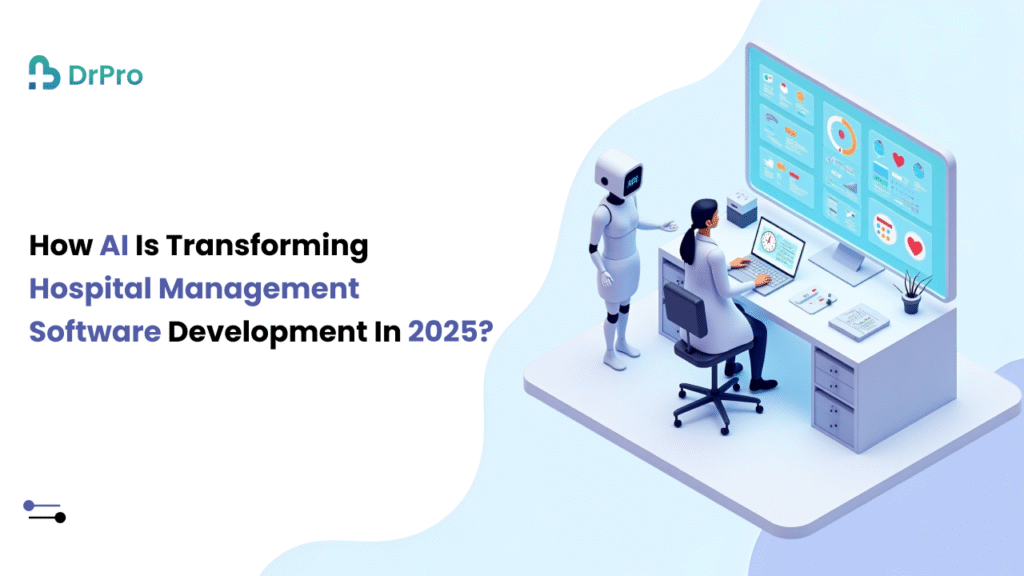The healthcare sector is now being revolutionized by technology on fast trains. AI acts as a big disruption in hospital management software in the year 2025. AI helps keep the hospitals running smoothly, delivers faster patient treatment, and aids better decision-making.
This blog will discuss AI-based hospital management software changes, the benefits, and their relevance to healthcare in the future.
What Is Hospital Management Software?
Hospital management software is one of the tools considered for hospitals to manage their day-to-day tasks. These include:
- Patient records
- Appointments
- Billing and payments
- Lab reports
- Staff scheduling
- Inventory and supplies tracking
Before AI implementation, most systems used to be manual or rule-based. With AI, systems are becoming much more intelligent and efficient.
📲 Follow us on Facebook, Instagram, Twitter, App Store, IOS Store, LinkedIn & YouTube for more wellness tips!
How AI Helps in Hospital Management Software
1. Faster Patient Registration and Appointment Booking
- AI can enable a patient to register by scanning his/her ID and filling up forms.
- Chatbots can fix appointments 24 hours without the need for receptionists.
- AI-based systems send automatic reminders to reduce no-shows.
Impact: Saves time for both patients and the staff.
2. Smarter Electronic Health Records (EHR)
- AI sifts through and organizes patient records.
- It highlights relevant medical data, allergies, past illnesses, and treatments.
- Doctors receive fast summaries and recommendations.
Impact: Improved diagnosis and treatment planning.
3. AI in Billing and Payments
- AI judiciously looks for any billing errors or insurance claims.
- It decreases fraud and delays in payments.
- Patients receive clear and correct bills.
Impact: Fast billing and a trustworthy patient domain.
4. Better Staff Scheduling
- AI analyzes hospital activities and schedules staff accordingly.
- It creates a balance in shifts, heightens morale, and improves patient care.
Impact: Happy staff and well-functioning hospitals.
5. Predicting Patient Needs
Patient data from different sources is fed to AI, which can:
- Predict those who could still require ICU care
- Identify risks of infections
- Help with early treatment
Impact: Doctors treat preliminarily and save lives.
6. Inventory and Supply Management
- AI tracks medicine and equipment in real time.
- It warns staff ahead of time that a certain item is about to run out.
- Reduction of wastage means saving of cost.
Effect: To ensure that hospitals do not run out of critical supplies.
7. Medical Imaging and Lab Reports
- AI tools read X-rays, MRIs, and blood reports faster than humans.
- They find signs of disease early, such as tumors or infections.
Effect: Future results and early diagnosis.
Why AI Is Important for Hospital Management in 2025
a. Growing Demand
More than ever before, hospitals today are treating patients. AI hence tries to manage this high demand by automating mundane tasks.
b. Data Explosion
Every single patient visit creates considerable data. AI can sift through and study such data to extrapolate significant patterns.
c. Shortage of Medical Staff
AI helps fill the gap by carrying out several secondary tasks like scheduling, billing, and reporting.
d. Need for Speed
In an emergency, seconds save lives. AI-enabled systems give quick access to patient medical information and help in urgent decision-making.
Challenges in Using AI in Hospital Software
1. Data Privacy
Patient data must be kept secure. AI systems must, therefore, respect any processes that ensure privacy, including HIPAA rules.
2. Training the System
Large amounts of training data are needed for an AI system to perform optimally. Hospitals should provide well-recorded cases.
3. Costs
Establishing an AI-based system could prove to be very expensive. Yet, in the long run, it reduces the cost of running a hospital since all processes become more efficient.
4. Staff Resistance
The doctors and staff may view this as a threat to their jobs, or it may be that they find it hard to accept change. Hence, a detailed training and awareness-building program will be required.
Conclusion
At DrPro, AI is changing the way hospitals work in 2025. It enables Hospital Management Software to work faster and act smarter, and helps make it more useful in terms of operations. From booking appointments to reading lab reports, AI is touching every aspect of healthcare.
Continuing in that line, hospitals would then deliver better care at a lower cost and smoother workflow; vice versa, patients could avail faster service, minimal errors, and better health benefits.
The future of healthcare depends on how we use tools like AI, and it looks very bright right now.
FAQs
Q1. What is AI in Hospital Management Software?
It means using smart computer systems to help with hospital tasks like appointments, billing, and patient care.
Q2. Is AI replacing doctors or nurses?
No. AI helps them work better, but doesn’t replace them.
Q3. Can small hospitals use AI systems?
Yes. Platforms like DrPro are making affordable AI tools for small clinics and hospitals.
Q4. Is AI safe for patient data?
Yes, if it follows data protection rules like HIPAA.
Q5. What are the top uses of AI in hospitals?
Appointment booking, patient records, billing, lab reports, and staff management.


